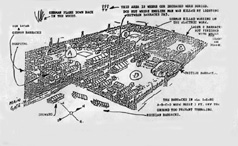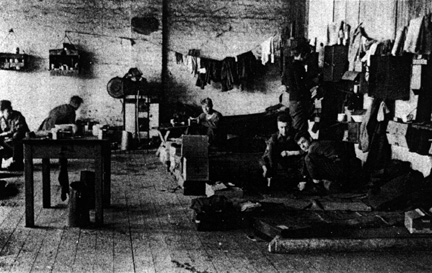|
Story of WW II Shoot Down and POW Experiences |
|||||||||||
 |
 |
||||||||||
|
Camp Life — The Good, The Bad and the Ugly On our arrival at Stalag-Luft IV we were taken into a large building where we were strip-searched and each piece of clothing was checked for hidden items like a compass, wire or anything that could assist in an escape or used for contact with the Allies. While I was being searched, I found myself waking up on the floor. As I got up slowly I received a second strike on my left side, knocking me down the second time. This was from Big Stoop, for no reason. The guard that was doing my search said he was sorry it happened but had no control over him. Big Stoop was over six feet tall and about 50 years old. He had very large hands which he used to cuff men on the ear drums. I was another of his subjects to see stars from his aggressive action and consequently have lost the hearing in my left ear. Part of the procedure was the completion of a personnel record card that had entries in both English and German languages. You may view my card by clicking here with an easy return to this page. |
|||||||||||
| After the search we were assigned barracks and rooms. Joe and I were assigned to the British barracks, but in adjacent rooms. Joe’s arm had received a bad wound which became so infected that we could not help him anymore without medical care. On October 25 Joe went to the hospital where he stayed until November 13. In the early stages, I changed the bandage daily and would rinse it out and reuse it the next day. |
|||||||||||
 |
|||||||||||
|
You may access a larger version of this drawing by clicking here with an easy return to this page. |
|||||||||||
|
I made acquaintance with the fellows in the room I was assigned to. The room chief was Douglas L. Boyer and he helped me settle in. After two weeks without a shower, I had my first bath with a pail of water. The best system was to buddy together and use one pail to soap up with and the second to rinse with, as each prisoner received only one pail of warm water. This was the first time I had my clothes off after being shot down and I found my left side was peppered with metal and Plexiglass. I had known something was amiss but until I had my shirt off and saw the holes and bloodied tee-shirt did I become aware of the extent of my injuries. I continued to pick particles out for several years.
|
|||||||||||
 |
|||||||||||
|
Joe and I were in the room adjacent to this room. In fact we had to go through this room to leave our own. |
|||||||||||
|
The room was about 20' x 24' with 16 built-in large double bunks and the British occupied all of these. I was number 19 in the room of 16 British and 3 Americans, so we Americans slept on the benches or tables as it was too cold to sleep on the floor. As the nights got colder, it became too cold to sleep on the benches or the table. Some of the British doubled up and gave their bunk to an American. I was the only one trying to sleep on the table. As the temperature dropped it was so cold I had everything on including my overcoat and two issue blankets, one GI Red Cross issue and one a German horse blanket and I was still cold. We had a stove in the room to cook and have heat on but only so many charcoal blocks per day; so, we conserved on their use in order to keep our ration. Because I complained so strongly about the cold, I was invited to share a bunk with a British roommate, but after about two hours I was out sitting on the table trying to sleep with everything I had on. The next morning Doug Boyer stated we Americans could have his bunk and he would share with Slim White from Ontario, which made for a lot better sleeping. We sewed the GI blankets into a bag and covered ourselves with the German blanket and our GI coats and we slept well for a change. The 25 watt bulb that hung from the center of the room was the total light for the room and lights out was either seven or eight o'clock. If the lights came on later, either new prisoners were arriving or it would be a shakedown to check our IDs, look for items of escape or contraband we should not have.
Food was always on our minds and after being hungry so long, it just became another ache. The Germans supplied some food, a Chicory type coffee, very thick and syrup-like for breakfast. If you had something from your Red Cross parcel to go with this, it helped quiet the hunger pangs. Hot water was supplied about 10:00, 12:00 and 3:00. A stew of potatoes, sweets (type of rutabaga) or barley was the evening meal with about a one inch thick block of bread for each. This was received by loaf and two persons were detailed each day to cut and divide evenly, with all participants watching. An old deck of cards was set in a manner that each piece of bread had a matching card and each would draw and take their piece of bread. That one inch piece of bread was so heavy that with a sharpened dinner knife it could be cut very thin and used in conjunction with whatever we had available f rom the Red Cross parcels. The Red Cross parcels that we received were designed to sustain one person for one week. We only received one-fourth parcel per person, as it was hard to get transportation, especially at this time when the Alllies controlled the skies. The regular Red Cross food parcel contained the following: 16 Oz powdered milk — 2 Oz powdered coffee or 1/4 Lb tea — 8 Oz sugar cube — 16 Oz margarine - can — 8 Oz cheese - box or can — 4 Oz pate - chopped liver or chicken — 6 Oz jam — 8 Oz salmon, tuna or sardines — 8 Oz cocoa or m&m candy or chocolate — 12 Oz spam, stew or corned beef — 8 Oz biscuits or cerial — 4 Pk cigarettes — 2 soap bars small — 16 Oz raisins or prunes — 1 Oz salt & pepper mixture or salt or vitamin C. The Red Cross parcel for Christmas we received was divided one per two persons and contained the following: 16 Oz turkey - canned — 16 Oz pudding - can — 6 Oz frankfurters — 6 Oz deviled ham — 6 Oz jam — 6 Oz honey — 12 Oz candy - mixed — 8 Oz nuts - mixed — 2 Ea fig bars — 6 Oz cherries — 16 Oz dates — 2 Oz tea — 4 Oz cheese - can — 4 Oz butter - can — 2 Oz bouillon cubes — 4 pkgs gum — 3 pkgs cigarettes — 1 pkg pipe tobacco — 1 Ea pipe — 1 Ea pk playing cards — 1 Ea cribbage set (still have and use) With the above Red Cross parcels and the German ration we were hungry, but by carefully planning our available food we could keep down the hunger pangs. Using the hot water available, with a pinch of coffee or tea and something from the ration of bread helped keep the hunger pangs under control. The daily schedule was coffee from the mess hall. Roll call at 9:00 and 4:00 every day with each barracks lined up in front of their respective building in four lines. The guards, one in front and one in back, would count everyone. If the count did not come out, we stood and were counted until it did. We had an elected Compound Chief and an elected Barracks Chief and a Room Chief. The German Commandant was an elderly gentleman, very neat in dress. I met him personally during a barracks individual check. My record was handed to him and he wanted to see me, an American in with the British. He did not speak any English at all. The British were very afraid of the Germans and many times would just shake when a guard was around. There were guards that just roamed through the barracks and rooms to see what everyone was doing and not doing something that was forbidden (verboteh). The one that came into the room most of the time was a little fellow and his clothes hung on him like they were five sizes larger than needed and he always seemed to have a stupid grin. As he walked in the room someone would state loudly “goons up”. After a few times whenever the door opened he would state “goons up” as he entered. The days were spent by walking around the compound and sometimes a little more if we were not too hungry. We also would read whatever we could. There was a small library of paperbacks which gave some help in finding something to read. Another was card playing and usually a game or two was going on all the time. Regardless, our freedom was lost and we were so far from anywhere and just trying to keep our sanity and our hopes up. We could see our strength slip away because of our poor diet and the lack of proper vitamins were affecting us. If you would cut or scratch yourself it would not heal, just fester but not heal. When the holidays came, like Thanksgiving, Christmas and New Years, it was a lonely time. Through the good old American ingenuity, we received the BBC news daily. Radio receivers were made from tin cans and you name it. To receive the news we had to have a hiding place and Allied guards were posted whenever the radio was in use so Jerry could not walk in and find that radio. Then it was walking time to all barracks rooms to relay the news. This had to be done in a manner that was not a fixed pattern so we posted a guard in the hall. This is how we kept up with the way the war was going. By the attitude of the guards we also knew how things were going, such as the Battle of the Bulge, when the Germans had the upper hand they were very jubilant. The news was early that day and what a downfall to us. When the Allies stopped their advance, the guards were long-faced and the needle was out by the Americans. The weather kept getting colder and with the little food (one-fourth parcel) that the Germans supplied was not enough to sustain us. We saw this in each other as our ribs were more predominate and we did not move around very much, except for roll call. We wore everything we had and sometimes even wrapped a blanket about us. We started to hear the rumble of cannon fire, off to the east and knew the Russians were on an assault. The next information to come was that there were too many persons in camp and the overflow would be moved out. End of Chapter 7 Go to Cover — Introduction — Table of Contents Chapter — 1 — 2 — 3 — 4 — 5 — 6 — 7 — 8 — 9 — 10 — 11 — 12 — 13 Or Go To Home - Contact Us - Cold War Hist. - 91st SRS Hist. - Stardust 40 Mission Story |
|||||||||||